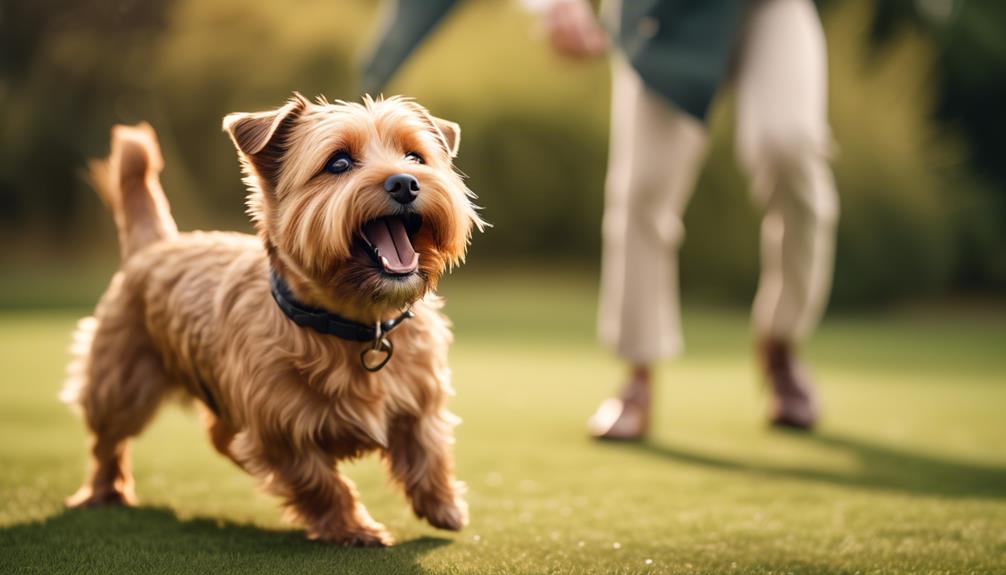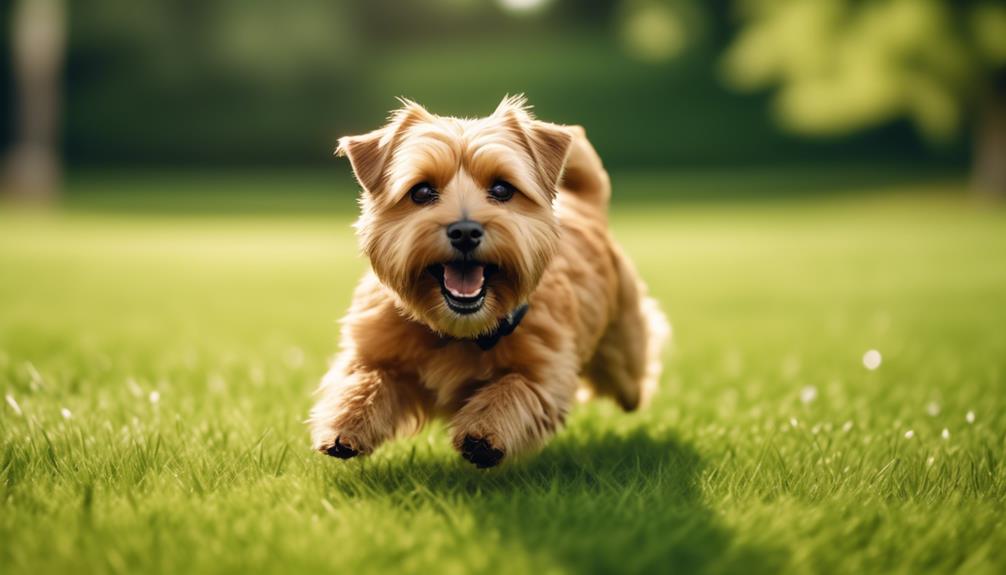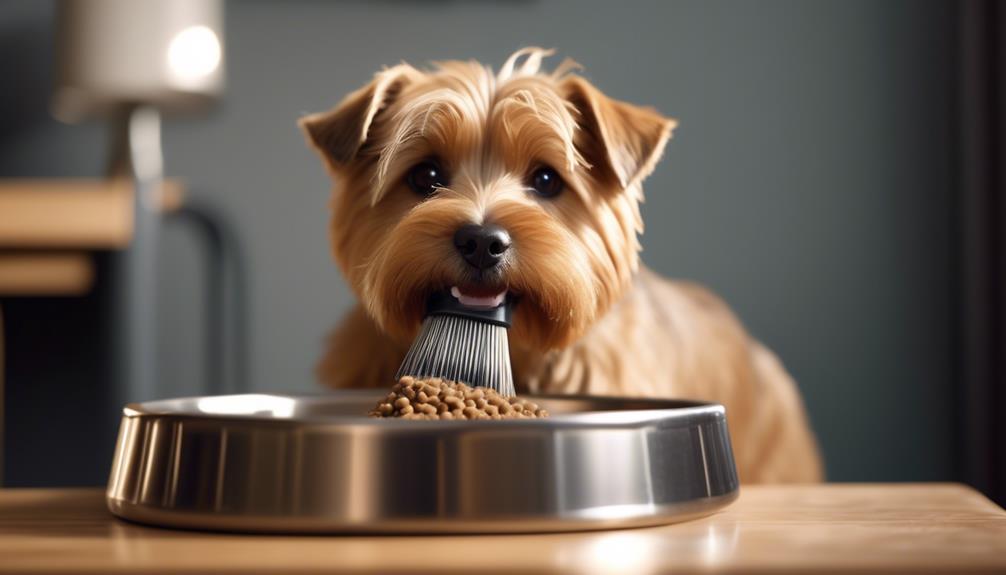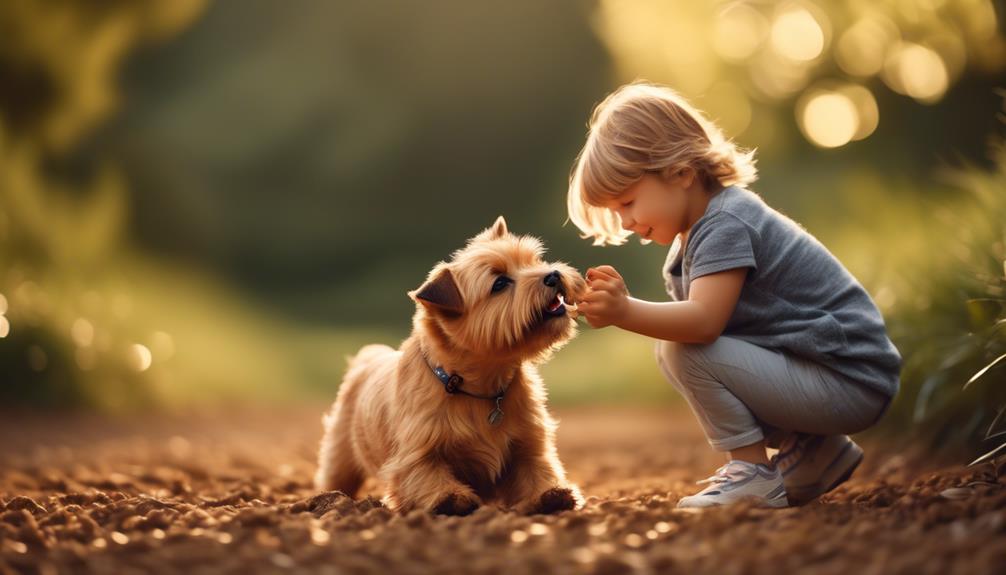Amidst the vast array of dog breeds, the Norfolk Terrier stands tall, well, figuratively speaking. This spirited little canine from England has captured the hearts of many with its affectionate nature and playful demeanor.
But there's more to this breed than meets the eye. Behind those adorable eyes lies a world of information waiting to be explored, characteristics that make the Norfolk Terrier a unique companion.
From its origin and size to its interaction with children and rescue organizations, this discussion will shed light on all that makes the Norfolk Terrier truly exceptional.
Key Takeaways
- Norfolk Terriers are small, affectionate, and playful dogs that make great companions.
- They have a wiry, double coat that requires moderate grooming to prevent matting.
- Norfolk Terriers are relatively easy to train, but can be stubborn and yappy.
- They are well-suited to apartment living and have low-energy needs, but still require regular exercise and mental stimulation.
Origin and Size
The Norfolk Terrier, a small terrier breed originating from England, is known for its compact size and charming personality. Standing at just 9-10 inches at the shoulder and weighing 11-12 pounds, it's a pint-sized companion that packs a lot of heart.
Despite its small stature, the Norfolk Terrier is a sturdy and well-built dog, capable of keeping up with an active lifestyle. Its wiry coat, which comes in various colors such as red, wheaten, black and tan, or grizzle, adds to its adorable appearance.
With its affectionate nature, playful spirit, and loyalty, the Norfolk Terrier makes for a delightful family pet. While it may have a stubborn streak and a tendency to be yappy, it's relatively easy to train with the right approach.
Temperament and Training

With their affectionate nature, playful spirit, and loyalty, Norfolk Terriers are delightful family pets. They've a temperament that makes them great companions and they're relatively easy to train. However, it's important to note that Norfolk Terriers can be stubborn and yappy at times.
Here are three key points to consider about their temperament and training:
- Affectionate and playful: Norfolk Terriers are known for their loving and playful nature. They enjoy spending time with their family members and are always ready for a game or a cuddle.
- Intelligent: These dogs are smart and quick to learn. They respond well to positive reinforcement training methods and enjoy mental stimulation activities.
- Stubbornness and yappiness: Norfolk Terriers can be independent and strong-willed, which may result in stubborn behavior. They can also be prone to excessive barking if not properly trained and socialized from a young age.
Adaptability and Living Environment

Adapting well to various living environments, Norfolk Terriers are a versatile breed known for their adaptability. They can thrive in both apartment living and larger homes, making them suitable for a wide range of living situations.
Despite their small size, Norfolk Terriers are quiet and low-energy, making them well-suited for smaller living spaces. When selecting a dog, it's important to consider the comfort of neighbors, so choosing a breed that's known for good manners and low sensitivity, like the Norfolk Terrier, can help create a harmonious living environment.
Health and Care

When it comes to the health and care of Norfolk Terriers, it's important to be aware of certain considerations. These small dogs are generally healthy, but like any breed, they can be prone to certain health issues. Here are some important points to keep in mind:
- Common health problems: Norfolk Terriers may be prone to Mitral Valve Disease (MVD), Canine Hip Dysplasia, arthritis, and patellar luxation.
- Sensitivity to vaccinations: Some Norfolks may be sensitive to routine vaccinations, so it's important to work closely with a veterinarian to ensure their vaccinations are administered safely.
- Exercise and grooming needs: Norfolk Terriers need at least one 20 to 30 minute vigorous walk or play session daily. Regular grooming is also required to maintain their wiry coat.
Feeding and Grooming

What are the recommended guidelines for feeding and grooming a Norfolk Terrier? When it comes to feeding a Norfolk Terrier, it is important to provide them with high-quality dry food. The recommended daily amount is 1/2 to 1 cup, divided into two meals. However, it is crucial to monitor their weight and prevent obesity, as Norfolk Terriers are prone to gaining weight. In terms of grooming, regular maintenance is necessary to keep their wiry coat in good condition. This includes weekly brushing, regular toenail trimming, and cleaning or checking their ears weekly. Additionally, monthly bathing is recommended. To summarize the feeding and grooming guidelines for a Norfolk Terrier, the following table provides a concise overview:
| Feeding Guidelines | Grooming Guidelines |
|---|---|
| 1/2 to 1 cup of high-quality dry food daily | Weekly brushing |
| Divided into two meals | Regular toenail trimming |
| Monitor weight to prevent obesity | Weekly ear cleaning/checking |
| Monthly bathing |
Interaction With Children, Pets, and Rescue/Breed Organizations

Norfolk Terriers are known for their friendly and sociable nature, making them excellent companions for children, other pets, and potential rescue or breed organizations. Here are a few reasons why Norfolk Terriers thrive in these interactions:
- Good with children: Norfolk Terriers are patient and gentle, making them suitable for households with children aged 10 and older.
- Lives happily with other dogs: These terriers enjoy the company of other dogs and can coexist peacefully in a multi-pet household.
- Not suitable for small animals: Due to their strong prey drive, Norfolk Terriers may not be the best fit for homes with small animals like rabbits or guinea pigs.
If you're considering adopting a Norfolk Terrier, rescue organizations such as Norfolk Terrier Club and California Norfolk Terrier Rescue offer rewarding opportunities. Additionally, finding a reputable breeder who screens their breeding stock and provides lifetime support is crucial for the well-being of these charming companions.
Frequently Asked Questions
Are Norfolk Terriers Good Guard Dogs?
Norfolk Terriers are not typically known for being good guard dogs. While they are alert and may bark to alert their owners, they are generally more affectionate and playful rather than being protective or aggressive.
How Often Should Norfolk Terriers Be Taken to the Veterinarian?
Norfolk Terriers should be taken to the veterinarian at least once a year for routine check-ups, vaccinations, and preventive care. Regular vet visits are essential to ensure their overall health and address any potential health issues.
Can Norfolk Terriers Live Comfortably in Hot Climates?
Norfolk Terriers can struggle in hot climates due to their thick double coat. It is important to provide them with plenty of shade, fresh water, and avoid excessive heat exposure to ensure their comfort and well-being.
Do Norfolk Terriers Shed a Lot?
Yes, Norfolk Terriers do shed, but not excessively. Their wiry, double coat requires regular grooming to prevent matting. However, compared to other breeds, they are considered to have a moderate shedding level.
Can Norfolk Terriers Be Left Alone for Long Periods of Time?
Norfolk Terriers should not be left alone for long periods of time as they thrive on human companionship. They may become anxious, bored, or develop separation anxiety. It is important to provide them with regular exercise and mental stimulation.
What are the differences between Norfolk Terriers and Lakeland Terriers in terms of characteristics and traits?
Norfolk Terriers and Lakeland Terriers have distinct lakeland terrier breed characteristics. Norfolk Terriers are small, sturdy, and fearless with wiry coats. They are known for their affectionate nature and great companionship. On the other hand, Lakeland Terriers are bold, independent, and very intelligent, with a strong prey drive and a protective instinct.
Conclusion
In conclusion, Norfolk Terriers are a delightful and affectionate breed that make excellent companions for individuals and families. With their playful and loyal nature, they thrive in an active environment and require plenty of exercise to stay happy and healthy.
Although they may be stubborn at times, they're relatively easy to train. Regular grooming is necessary to prevent matting, and potential owners should be aware of potential health issues.
Overall, Norfolk Terriers are a wonderful choice for those seeking a small and spirited companion.




